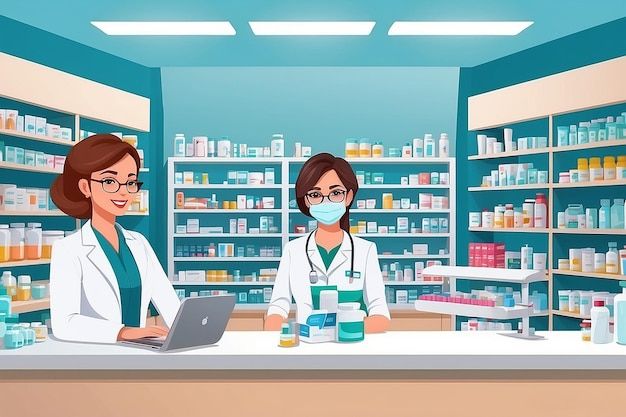9 Undeniable Truths About Hospital Pharmacists That Will Restore Your Faith in Modern Healthcare
In the modern healthcare ecosystem, hospital pharmacists often work silently behind the scenes—ensuring medication accuracy, patient safety, and optimal therapeutic outcomes. While doctors prescribe and nurses administer, it’s the hospital pharmacists who verify, compound, monitor, and correct medications that sustain and save lives every single day.
- 📜 History of Hospital Pharmacists
- 📚 Important Facts About Hospital Pharmacists
- 🔍 What Does a Hospital Pharmacist Actually Do?
- 🌍 Significance of Hospital Pharmacists in Healthcare
- ✅ Importance of Hospital Pharmacists in Our Lives
- 💬 FAQs on Hospital Pharmacists
- 1. Is a hospital pharmacist the same as a community pharmacist?
- 2. Can a hospital pharmacist recommend medicine?
- 3. Do hospital pharmacists interact with patients?
- 4. What are the career prospects for hospital pharmacists?
- 5. Are they involved in research?
- 🎉 Wishing Hospital Pharmacists: Celebrating the Silent Saviors
- 🔑 Key Points to Remember
- 📌 Observance: World Pharmacist Day – September 25
- 💡 Why Hospital Pharmacists Matter to Society
- ✨ Conclusion: Hospital Pharmacists Are the Guardians of Rational Therapy
This article uncovers the powerful history, facts, timeline, FAQs, significance, observance, and day-to-day importance of hospital pharmacists, showing how vital their role truly is in ensuring hospital operations run safely and smoothly.
📜 History of Hospital Pharmacists
The concept of organized medication handling within hospitals dates back centuries. However, hospital pharmacy as a profession began taking structured shape during the 18th and 19th centuries.
🕰️ Timeline of Hospital Pharmacists
9th Century (Baghdad) – The earliest hospitals had rudimentary pharmacies, often supervised by physicians.
Middle Ages – European monasteries began maintaining hospitals with separate dispensers of medicine.
18th Century – Formal hospital pharmacy positions were created in military and public hospitals.
1842 (USA) – First American hospital pharmacist: Charles Rice at New York Hospital.
1940s-60s – Rapid evolution due to World War II and rise of antibiotics.
Modern Era – Hospital pharmacists are now specialists in clinical pharmacology, drug safety, oncology, ICU pharmacotherapy, and more.
📚 Important Facts About Hospital Pharmacists
Every major hospital employs trained pharmacists who handle both inpatient and outpatient medication needs.
They are required to cross-verify prescriptions for drug interactions, allergies, or dosage errors.
Hospital pharmacists are involved in clinical trials, formulary decisions, and ward rounds.
They use sophisticated pharmacy information systems (PIS) to manage drug data.
In India, B. Pharm or Pharm D qualifications are typically required, along with registration under PCI or state councils.
🔍 What Does a Hospital Pharmacist Actually Do?
The work of a hospital pharmacist is both dynamic and life-critical. Their roles include:
Dispensing inpatient and outpatient medications
Reviewing prescriptions for accuracy and safety
Compounding sterile and non-sterile medicines
Providing clinical drug information to physicians
Monitoring adverse drug reactions (ADRs)
Participating in ward rounds for better patient care
Educating patients at discharge about how to use medications safely
They’re not merely “pill counters” but clinical decision-support experts who collaborate closely with doctors, nurses, and healthcare teams.
🌍 Significance of Hospital Pharmacists in Healthcare
🏥 Inside the Hospital:
They reduce medication errors, a leading cause of hospital deaths.
They ensure cost-effective prescribing through formulary management.
Pharmacists participate in infection control programs.
They play a key role in critical care, oncology, pediatrics, and transplant units.
They optimize therapy outcomes, improving recovery rates and lowering readmissions.
🌐 In Broader Healthcare:
Help fight antibiotic resistance by regulating antimicrobial use.
Improve public health through participation in awareness drives.
They are key stakeholders in disaster preparedness and epidemic response (e.g., COVID-19).
✅ Importance of Hospital Pharmacists in Our Lives
💊 In Daily Life:
Provide confidence in hospital-prescribed medicines.
Ensure safe medicine administration especially in surgeries, ICUs, or emergencies.
Help patients understand how to use post-discharge prescriptions correctly.
Assist in creating customized drug plans for complicated conditions like cancer, kidney failure, or transplant recovery.
👨⚕️ In Critical Situations:
Save lives by identifying wrong dosages or harmful interactions before administration.
Offer rapid decisions during code blue (cardiac arrest) or sepsis management.
Work during night shifts, weekends, and emergencies, ensuring 24/7 drug safety.
💬 FAQs on Hospital Pharmacists
1. Is a hospital pharmacist the same as a community pharmacist?
No. While both are pharmacists, hospital pharmacists deal with inpatients, critical care, and complex treatments, while community pharmacists serve the public directly in retail settings.
2. Can a hospital pharmacist recommend medicine?
They cannot prescribe, but they can suggest modifications, flag errors, and guide doctors during prescription decisions.
3. Do hospital pharmacists interact with patients?
Yes, especially during discharge counseling, ward rounds, and specialist clinics.
4. What are the career prospects for hospital pharmacists?
Excellent! From clinical pharmacy, oncology, ICU specialization, to hospital administration, the scope is vast and growing globally.
5. Are they involved in research?
Absolutely! Hospital pharmacists often contribute to drug studies, clinical trials, and academic publications.
🎉 Wishing Hospital Pharmacists: Celebrating the Silent Saviors
A moment of appreciation can mean the world. Here’s a thoughtful wish for them:
“To the hospital pharmacists who stand guard behind every dose and every decision—thank you for being the unseen angels of healthcare. Happy Pharmacist Day!”
You can honor them by:
Sharing posts on September 25: World Pharmacist Day.
Organizing hospital appreciation events or health quiz competitions.
Creating thank-you boards or spotlighting individual pharmacists in hospital newsletters.
🔑 Key Points to Remember
Hospital pharmacists are life-critical professionals.
They collaborate with doctors and nurses in all major hospital units.
Their role ensures accurate, timely, and safe medication delivery.
They reduce hospital mortality by preventing medication errors.
Their presence enhances patient confidence and recovery rates.
📌 Observance: World Pharmacist Day – September 25
Each year, this day celebrates the contributions of all pharmacists, including hospital ones. It is:
Spearheaded by the International Pharmaceutical Federation (FIP).
Aimed at promoting safe, accessible medication practices.
An opportunity to raise awareness about pharmacy education and healthcare delivery.
💡 Why Hospital Pharmacists Matter to Society
In today’s healthcare maze, trust is fragile. Miscommunication, drug resistance, or even a single wrong dose can risk lives. That’s where hospital pharmacists act as protectors of therapeutic precision.
They not only handle drugs, but also:
Create interdisciplinary treatment success.
Promote rational drug use and evidence-based practices.
Educate both patients and professionals.
In a world dealing with rising healthcare complexity, hospital pharmacists restore faith in safe, personalized, and intelligent medicine use.
✨ Conclusion: Hospital Pharmacists Are the Guardians of Rational Therapy
Hospital pharmacists may not wear stethoscopes, but they carry the immense responsibility of ensuring that every treatment pathway is safe, effective, and efficient. From checking drug compatibility in ICU to guiding a cancer patient on oral chemotherapy at discharge, their influence is constant and often invisible—but always invaluable.
So next time you or a loved one receives medicine in a hospital—remember, a hospital pharmacist likely ensured its safety, dosage, and efficacy.
✅ Final Thought:
“When medicines heal instead of harm, it’s often because a hospital pharmacist was watching.”








